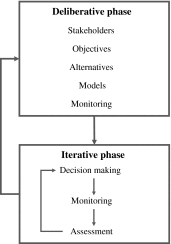Adaptive management: from more talk to real action
- PMID: 24271618
- PMCID: PMC4544568
- DOI: 10.1007/s00267-013-0205-7
Adaptive management: from more talk to real action
Abstract
The challenges currently facing resource managers are large-scale and complex, and demand new approaches to balance development and conservation goals. One approach that shows considerable promise for addressing these challenges is adaptive management, which by now is broadly seen as a natural, intuitive, and potentially effective way to address decision-making in the face of uncertainties. Yet the concept of adaptive management continues to evolve, and its record of success remains limited. In this article, we present an operational framework for adaptive decision-making, and describe the challenges and opportunities in applying it to real-world problems. We discuss the key elements required for adaptive decision-making, and their integration into an iterative process that highlights and distinguishes technical and social learning. We illustrate the elements and processes of the framework with some successful on-the-ground examples of natural resource management. Finally, we address some of the difficulties in applying learning-based management, and finish with a discussion of future directions and strategic challenges.
Figures





References
-
- Allen GM, Gould EM., Jr Complexity, wickedness, and public forests. J For. 1986;84:20–23.
-
- Allen WJ, Bosch OJH, Kilvington MJ, Harley D, Brown I. Monitoring and adaptive management: addressing social and organisational issues to improve information sharing. Nat Resour Forum. 2001;25:225–233. doi: 10.1111/j.1477-8947.2001.tb00764.x. - DOI
-
- Argyris C, Shon D. Organization learning: a theory of action learning. Reading, MA: Addison-Wesley; 1978.
-
- Bormann BT, Kiester AR. Options forestry: acting on uncertainty. J For. 2004;102:22–27.
-
- Bormann BT, Haynes RW, Martin JR. Adaptive management of forest ecosystems: did some rubber hit the road? Bioscience. 2007;57:186–191. doi: 10.1641/B570213. - DOI
MeSH terms
LinkOut - more resources
Full Text Sources
Other Literature Sources

